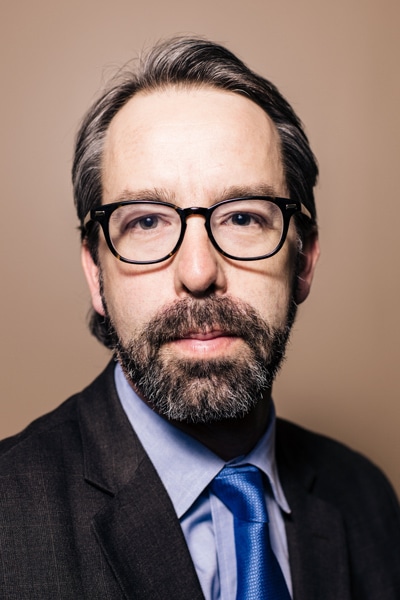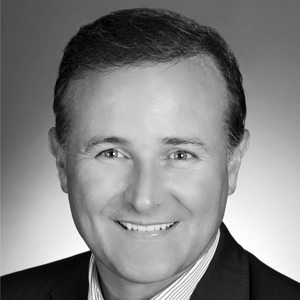
David Adams, general counsel and senior vice president of legal, regulatory and government affairs at Kaplan Higher and Professional Education, likes to say he had to try everything else before he committed to law.
With a father and older sister in the legal profession, he was exposed to it early and often—but he attended Michigan State University on a gymnastics scholarship and bounced through a handful of majors before finally settling on a course for law school.
“I wanted to do criminal defense, so I was going to be Perry Mason: defend the wrongfully accused, make stirring arguments, and that kind of thing,” he says.
As a young associate, he started down that track, but he quickly realized that he wasn’t going to be in the courtroom righting wrongs every day. He spent a great deal of time reading, writing, and analyzing, and eventually decided to send his career in a less-televised direction. As an associate at Schiff Hardin, then at Canel, Davis and King, he worked in construction, insurance, and civil rights litigation.
After a colleague invited him to a gubernatorial campaign fundraiser in 2004, Adams began to pursue a growing interest in politics by contributing to campaigns as a policy advisor and as a volunteer. Encouraged by the camaraderie in that world, and propelled by that same noble sense of purpose, he eventually landed a job with the Illinois Attorney General’s office.
At that time, Illinois attorney general Lisa Madigan was exploring the use of the office as an instrument of consumer protection. She started a team, and Adams became a senior member. By the end of his four years there, that team would grow to twenty prosecutors.
In 2008, Adams served as lead state prosecutor against Amerigroup Corporation, a health insurance provider accused of defrauding the Illinois Medicaid program. Amerigroup was compelled to provide coverage to all applicants—and received reimbursements from the state as though they were—but they denied some applicants with expensive-to-treat pre-existing conditions. In essence, they were receiving payment for coverage they hadn’t provided, and one of their own legal professionals blew the whistle.
The jury ruled against Amerigroup. The $334 million award was, at the time, the largest award of its kind in the 140-year history of the False Claims Act. Adams had never felt so rewarded as a legal professional.
“We had a very cohesive and congenial group of people who were very close, who all felt like we were working for the good of society, so it was a very satisfying place to work,” Adams says. “It’s difficult, because you’re always thinking, ‘I could be making a lot more money doing something else.’ But it’s worth it, because it’s satisfying to feel like you’re on the right side of things.”
Adams has noticed a similar energy at Kaplan, where he’s served since leaving the public sector in 2008. He’s still surrounded by thinkers and leaders who are deeply and earnestly invested in the organization’s mission: “There’s a group of people here who feel like they’re changing higher education for the better, and who really feel good about being on the cutting edge of higher education service,” he says.
Working at the attorney general’s office, he recalls, Adams and his team were usually able to focus on one or two major projects at a time. Here at Kaplan, there are legal challenges of every size and severity demanding his attention at any time, so he’s had to adapt with a new system and a mind-set to get things done.
“I’ve got dozens of balls in the air at any one time, and the biggest responsibility is to make sure I don’t drop any of the big breakable ones,” he explains. “I’m going to drop some. The priority is keeping the really important stuff in the air, knowing that I’m never going to get to everything.”
One simple ritual has helped Adams develop a new way of accomplishing tasks. Each morning, when he arrives at his downtown Chicago office, he sits behind his desk but doesn’t log into his computer. He clears a space for paper and a pen to list the day’s important tasks—ten, maybe—and designates a block of time for emails and phone calls.
Of course, he recognizes that it’s nothing revolutionary, and there are dozens—if not thousands—of apps available to facilitate or complicate this task. But these are more than just quick to-dos scribbled on sticky notes: they’re a historical record. He doesn’t throw them out. He reviews each one at the end of the day—and a stack of them every few weeks—to assess his ability to prioritize and produce high-quality work.
“People who work for me see how I approach things, and I’m trying to be somebody they want to emulate,” he says. He doesn’t rely on any one leadership style or approach.“You’ve got to cater it to the individual,” he says.
Most of all, he aims to lead by example. In conjunction with that, he believes strongly in hiring the right people and providing opportunities for them to prove themselves, pursue their interests, and grow professionally. Adams isn’t a micromanager. He can’t be, because he’s too busy.
“There was a big push a few years ago—even at Kaplan—for having game rooms and that kind of stuff in the office, “ he says. “That’s great, but what makes people really happy is feeling that they’re contributing, that they’re good at their job, that they have a say in where the entity is going and where their career is going.”
Photo: Caleb Fox
Off the Clock with David Adams
Each morning, David Adams springs out of bed at 5:00 a.m., retrieves his bicycle, and rides until 7:00 a.m. He usually has a race coming up, so he sticks to his training plan. “If I miss a day, I get anxious. If I miss two, I get really anxious,” he says with a laugh.
While traveling, he looks for rentals or cycling centers, and he primarily trains indoors during Chicago’s winters.
Adams has a competitive spirit, and he’s found that cycling is the healthiest way for him to express it. “I’m doing it for the pure enjoyment of it,” he says. “I’m not really a corporate climber type, not competitive at work necessarily, so I think it provides that outlet for me.”

